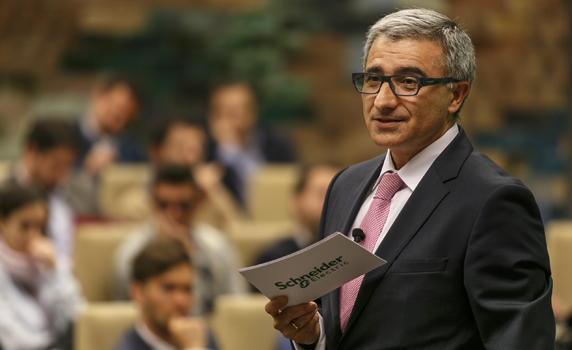
Schneider Electric, with 140,000 employees in over 100 countries, is no stranger to transformation. From steel in the 19th century to electrical distribution and automation in the 20th century, to energy management today, the company has evolved in step with a changing world. The demands the next decade and century will place on energy distribution, however, will require that its senior executives like Julio Rodríguez, Executive VP of Global Operations, rise to the occasion in order to stay one step ahead. He shared his thoughts about the rapid acceleration of change in the world and the impact for the energy industry with MBA students on February 28, 2014 as part of the IESE Global Leadership Series.
Agility Every Step of the Way
"We have been successful in our transformation over the last 10 years," said Rodríguez, referring to Schneider’s geographic diversification, expanded portfolio, and conversion from selling products, to solutions. "Yet the coming decades will require taking what we can foresee about the challenges ahead and make decisions accordingly."
Schneider is enjoying a strong position as one of the largest technology-based companies in the world reporting €24 billion in sales in 2012. However, looming on the horizon are demographic shifts that will place increasing pressure on an an already stressed energy infrastructure and distribution.
"We are focusing on balancing energy efficiency, service to customers and the impact on the planet," Rodríguez told the audience. "The new vision underlying this challenge is to get more done with less; it’s about helping people make the most of energy by becoming a global specialist in energy management."
Experts anticipate that energy demands will double by 2030, a situation that without innovative technological and management solutions will be untenable for a planet that needs to halve its carbon emissions.
Much of this growth in demand will be in emerging countries, not just due to population growth, social mobility and urbanization; businesses in emerging countries are also becoming important contenders in the global arena. Rodríguez pointed out that today 125 of Fortune 500 companies are based in new economies. Therefore, the region has been an important focus for the company since it set its transformation in motion. Today the region represents 41% of its revenue, and is home to 50% of Schneider’s employees and 100 factories.
People as Key to Transformation
Herein lies Schneider’s challenge in the years ahead, explained Mr. Rodriguez: to confront this energy dilemma through a continued focus on R&D and innovation to deliver solutions for efficiency. An important part of this focus is about people. "We have been able to attract and develop talent; that’s why we have been successful over the last 10 years. That will also be the key for the next decade," he asserted.
In addition to the vital role that its 7,500 talented engineers have in corporate success, Schneider’s leading position in the industry would not be possible without top quality management. Mr. Rodriguez told the audience not to underestimate the importance of leadership to tackle the complexity ahead. "Leading by example and basing leadership on values to be credible in the long-term, value such as honesty, loyalty, respect for others, is the base of everything," he said. He underscored the importance of developing other people, and understanding that for each person developing abilities is a process of trial and error.